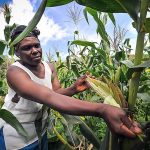
Mrs Alkali’s guinea corn farm was her family’s only asset but frequent cattle grazing on the farm meant she struggled to provide food for the children, and could barely pay their school fees. Unknown to her, an even bigger challenge was looming — the effect of climate change on farming communities in her area was becoming more rampant.
In May 2020, with the onset of rain, Mrs Alkali planted guinea corn, hoping to harvest before the herders arrived. But the rains stopped in August instead of November in what was becoming a norm, a deviation from the past. The poor harvest forced her to stop the construction of the new house she had started.
To improve the yields, she started using poultry droppings as fertiliser. She had bought 10 bags of the droppings from a neighbouring community at N5,000 per bag. To her delight, it increased the yields from 10 to 15 bags of guinea corn.




